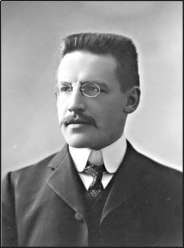- HAHN
- SWITZERLAND (see also List of Individuals)\
 22.9.1876 Genève/CH - 5.8.1948 Gland/CH\Ernest Hahn graduated as a mechanical engineer from the Swiss Federal Institute of Technology ETH in 1898. He remained there until 1902 as an assistant of Aurel Stodola (1859-1942) where he was responsible for experimental methods with hydraulic and thermal machinery. In 1903, Hahn moved to Ecole d'Ingénieurs de Lausanne, today's EPFL and was appointed in 1906 professor of hydraulic machinery at Institut d'Electrotechnique at Nancy University, France. There, he spent the rest of his career until retirement as a professor in 1939. He returned to Switzerland only after the end of World War II during which he had served as the Swiss Consul at the German-French border.\Hahn is known for the French translation of Stodola's book on vapor and gas turbines, a work that appeared in ten editions of which the sixth was translated. In parallel, Hahn was a member of the Stodola Symposium in 1929 following Stodola's retirement from ETH, bringing together a number of former students and friends, among which were Adolf Busemann (1901-1986), George Darrieus (1888-1979), Albert Einstein, Gustav Flügel (1885-1967), Richard Grammel (1889-1964), Max Jakob (1879-1955), Curt Keller (1903-1984), Hans Lorenz (1865-1940), Richard von Mises (1883-1953) Wilhelm Nusselt (1882-1957) and Ludwig Prandtl (1875-1953). Hahn was also a Member of Société Hydrotechnique de France SHF, where he contributed to hydraulic observations and hydraulic laboratories. The purpose of SHF was and still is to bridge the gap between university developments and industrial applications.\Hahn, E. (1927). Méthode expérimentale pour la résolution des équations du mouvement des fluides. Revue Générale de l'Electricité 21(14): 485-488.Hahn, E. (1929). Etude sur les coups de bélier dans les conduites de refoulement des pompes centrifuges. Stodola-Festschrift: 191-201. Orell-Füessli: Zürich.Hahn, E. (1936). Etude sur le déversoir en mince paroi sans contraction latérale. Revue Générale de l'Hydraulique 3(1/2): 762.Hahn, E. (1938). Résumé d'études relatives aux compléments à apporter à la méthode d'Allievi en vue de tenir compte des effets d'inertie des parois. Revue Générale de l'Hydraulique 5(5/6): 149-150.Hahn, P., Hager, W.H. (2003). Ernest-Paul Hahn, l'IEN et la SHF. La Houille Blanche 48(4): 103-106. PStodola, A., Hahn, E. (1925). Turbines à vapeur et à gaz. Dunod: Paris.
22.9.1876 Genève/CH - 5.8.1948 Gland/CH\Ernest Hahn graduated as a mechanical engineer from the Swiss Federal Institute of Technology ETH in 1898. He remained there until 1902 as an assistant of Aurel Stodola (1859-1942) where he was responsible for experimental methods with hydraulic and thermal machinery. In 1903, Hahn moved to Ecole d'Ingénieurs de Lausanne, today's EPFL and was appointed in 1906 professor of hydraulic machinery at Institut d'Electrotechnique at Nancy University, France. There, he spent the rest of his career until retirement as a professor in 1939. He returned to Switzerland only after the end of World War II during which he had served as the Swiss Consul at the German-French border.\Hahn is known for the French translation of Stodola's book on vapor and gas turbines, a work that appeared in ten editions of which the sixth was translated. In parallel, Hahn was a member of the Stodola Symposium in 1929 following Stodola's retirement from ETH, bringing together a number of former students and friends, among which were Adolf Busemann (1901-1986), George Darrieus (1888-1979), Albert Einstein, Gustav Flügel (1885-1967), Richard Grammel (1889-1964), Max Jakob (1879-1955), Curt Keller (1903-1984), Hans Lorenz (1865-1940), Richard von Mises (1883-1953) Wilhelm Nusselt (1882-1957) and Ludwig Prandtl (1875-1953). Hahn was also a Member of Société Hydrotechnique de France SHF, where he contributed to hydraulic observations and hydraulic laboratories. The purpose of SHF was and still is to bridge the gap between university developments and industrial applications.\Hahn, E. (1927). Méthode expérimentale pour la résolution des équations du mouvement des fluides. Revue Générale de l'Electricité 21(14): 485-488.Hahn, E. (1929). Etude sur les coups de bélier dans les conduites de refoulement des pompes centrifuges. Stodola-Festschrift: 191-201. Orell-Füessli: Zürich.Hahn, E. (1936). Etude sur le déversoir en mince paroi sans contraction latérale. Revue Générale de l'Hydraulique 3(1/2): 762.Hahn, E. (1938). Résumé d'études relatives aux compléments à apporter à la méthode d'Allievi en vue de tenir compte des effets d'inertie des parois. Revue Générale de l'Hydraulique 5(5/6): 149-150.Hahn, P., Hager, W.H. (2003). Ernest-Paul Hahn, l'IEN et la SHF. La Houille Blanche 48(4): 103-106. PStodola, A., Hahn, E. (1925). Turbines à vapeur et à gaz. Dunod: Paris.
Hydraulicians in Europe 1800-2000 . 2013.
